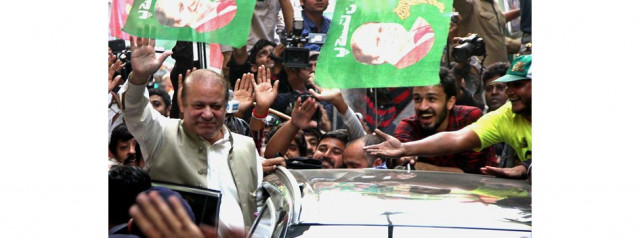PML-N most undemocratic political party: report
Report shows Jamaat-i-Islami stands at the top of the democratic scale

PHOTO: ONLINE
The ruling Pakistan Muslim League-Nawaz (PML-N) has been declared the least democratic political party when it comes to handling its internal affairs, according to an assessment by the Pakistan Institute of Legislative Development and Transparency (Pildat) – a think tank focussed on political and public policy research.
The annual report on internal democracy of major political parties was released on Monday.
Imran calls PML-N govt ‘democratic dictatorship’
The research focused on eight mainstream political parties, which received an overall score of 40% of 100, indicating a drop from the overall score of 43% in 2014. Five of these parties hold the largest number of seats in the National Assembly.
According to the report, the Jamaat-i-Islami (JI) stands at the top of the democratic scale with a percentage of 56%. The Hasil Bizenjo-led National Party follows with 47% and the Imran Khan-led Pakistan Tehreek-e-Insaf at 44%.

The fourth spot was claimed by the Awami National Party (ANP) with 40% followed by Pakistan Peoples Party (36%), Jamiat Ulema-e-Islam-Fazl and Muttahida Qaumi Movement MQM (both at 33%) and the last PML-N at 31%.
The ruling PML-N’s irregular or no party meetings, lack of competitive elections and continuation of the same leadership since the founding of the party are factors perceived as the major weaknesses in the democratic character of the party, according to the Pildat report.
The report shows the state of internal democracy of political parties – although not in good shape the previous year – further deteriorated in 2015.
The JI’s regular elections, changes in leadership through polls, meetings of consultative councils and the working committees and discouragement of dynastic leadership have apparently gone in its favour for getting the first position on the democratic political party scale.
The NP emerged as the second most democratic party – a significant improvement over its fourth position the previous year. Regular changes in top leadership since its founding in 2003, transparent party elections held in 2015 for all four provincial chapters, and lack of any sign of dynastic leadership have favoured its democratic credentials.
In order to assess democracy within political parties objectively and scientifically, a framework consisting of 12 indicators was devised by a broad-based steering committee constituted by Pildat.
Three other parties were chosen to either represent Balochistan and Khyber-Pakhtunkhwa or to capture a peculiar brand of internal democracy in the form of the JI.
A party-wise account of each of the 12 indicators was compiled after collecting data from various sources including the political parties. This account became the basis of quantitative assessment (scoring) for the parties.
Pildat noted an almost converse relationship between the quality of internal democracy of political parties and their mass popularity.
“The PML-N, MQM and PPP are popular parties and their weak internal democracy has not come in the way of their mass appeal,” observed PILDAT President Ahmed Bilal Mehboob.
He said the JI and NP on the other hand were rated the most democratic parties but seemed to have a weak mass appeal.
PML-N not even competent enough to rig polls properly: Imran
The PTI’s 2012-13 party elections were among the most popularly contested and elaborate party elections in the country’s history but these turned out to be deeply flawed by the party’s own admission, the report stated. The next PTI election, which is scheduled this year, will decide not only the party’s own democratic credentials, but the success or failure of this experiment may also decide the future trends in the internal party elections of political parties in Pakistan.
Published in The Express Tribune, February 23rd, 2016.



















COMMENTS
Comments are moderated and generally will be posted if they are on-topic and not abusive.
For more information, please see our Comments FAQ